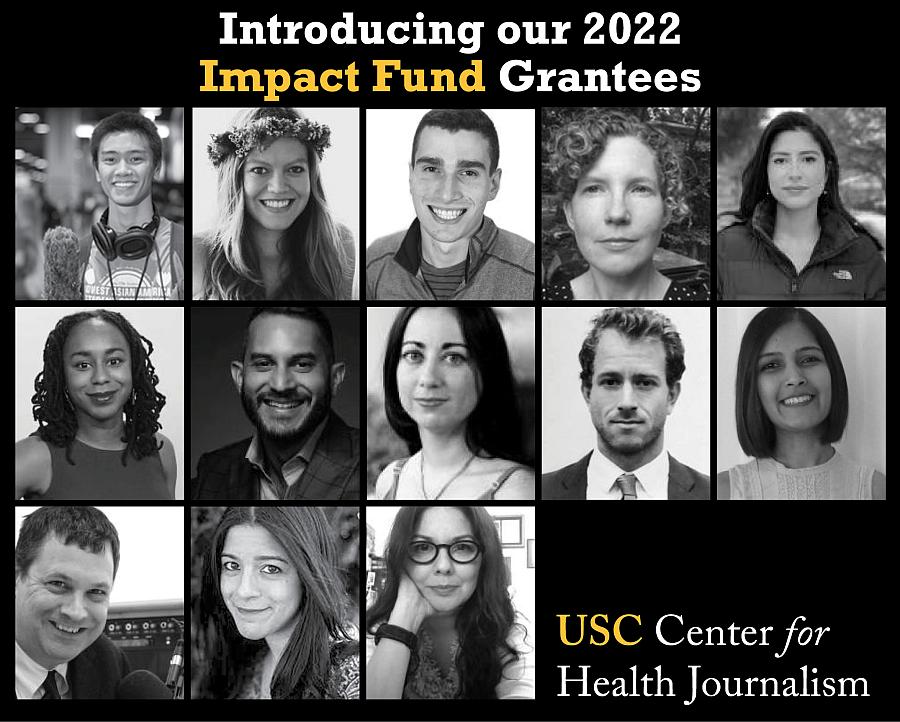Center awards over $50K to support journalism on health equity and health systems

(Graphic by Harold Pierce/CHJ)
The Center for Health Journalism at the USC Annenberg School of Journalism has awarded more than $50,000 in reporting grants from its inaugural 2022 Impact Fund for Reporting on Health Equity and Health Systems. Thanks to the generous support of The Commonwealth Fund, the initiative will support the work of 13 talented and diverse journalists from around the country — 70% of participating reporters are journalists of color.
We are so pleased to support these ambitious explanatory and investigative reporting projects, which delve into how health systems can impede health equity. Bringing attention to these issues is of critical importance to local communities and our nation.
“Informed and skilled journalism is critical to helping the U.S. move toward a more equitable health system,” said Barry Scholl, senior vice president for communications at the Commonwealth Fund. “We are proud to be working with the Center on this innovative new project and congratulate all of the reporters selected to participate.”
The grantees and their proposed projects are:
Ted Alcorn, New Mexico in Depth and multiple reporting partners, will report on the systemic reasons for the high death rate from alcohol for Native Americans in New Mexico.
Yvette Benavides and David Martin Davies, Texas Public Radio, will collaborate on a radio documentary in English and Spanish that explores health care barriers for Hispanic children with Type 2 diabetes in San Antonio and the long-term health implications for these children.
Eli Cahan, will investigate how uranium mining in the Southwest exposed members of Indian tribes to dangerous radiation, which has left many with chronic diseases such as fibrosis, leukemia and renal failure.
Angus Chen, STAT, will look into the reasons for the low participation rates of people of color in cancer trials and how that may affect the reliability of findings.
David Cordero Mercado and Marga Parés Arroyo, El Nuevo Día/GFR Media, will examine how the exclusion of U.S. citizens living in Puerto Rico from Social Security Disability (SSI) is reflected in their health disparities and living conditions.
Nada Hassanein, USA TODAY, will examine rural communities/communities of color that lack maternity health care and the impact on women’s health.
Anita Hofschneider, a reporter for Honolulu Civil Beat, will report on how Native Hawaiians and other Pacific Islanders who struggle with diabetes contend with barriers within the medical system while highlighting potential solutions.
Priyanka Runwal, National Geographic, will report on systemic barriers to immigrants seeking treatment for COVID-19.
Talis Shelbourne, Milwaukee Journal Sentinel, will examine the disproportionate asthma hospitalization rates among Milwaukee’s Black families, and its relationship to poor housing conditions and Milwaukee’s health and city government systems. The reporting will also appraise health systems that have improved asthma hospitalization rates.
Farah Yousry, WFYI, Side Effects Public Media and the Indianapolis Recorder, will document disparities between federal research and clinical support for two gene-based diseases: sickle cell disease, which primarily afflicts Blacks, and cystic fibrosis, which primarily afflicts whites, and the resulting outcomes for patients with these conditions.
Amy Yurkanin, Alabama Public Media, will investigate racial disparities in gynecological care in Alabama and the South.
Program participants will each receive a reporting grant of $2,000-$10,000, attend four monthly online trainings on the relationship between health systems and health equity, and receive mentoring from two of the nation’s top investigative journalists, Neil Bedi, a reporter at ProPublica in Washington, D.C., and Marisa Kwiatkowski, an investigative reporter at USA TODAY, both of whom have been National Fellows at the Center for Health Journalism.
Neil was previously an investigative reporter at the Tampa Bay Times. “Targeted,” his 2020 National Fellowship project with 2016 National Fellow Kathleen McGrory, received the 2021 Pulitzer Prize for Local Reporting and numerous other national awards. “Heartbroken,” his 2018 investigation with Kathleen into the alarming death rate at the cardiac surgery unit of a Florida children’s hospital, won the George Polk Award and was a finalist for the 2019 Pulitzer Prize for Investigative Reporting.
Marisa previously worked for media outlets in Michigan, South Carolina and Indiana. Her work has spurred federal and state investigations, criminal charges, resignations and changes to federal law and state policy and won 50 journalism awards. She and her IndyStar colleagues earned IRE's Tom Renner Award, as well as other national and state awards, for their investigation into USA Gymnastics’ handling of child sexual abuse allegations, including those against former doctor Larry Nassar.
The Center for Health Journalism sought proposals from journalists who think big and want to make a difference. We encouraged applications for newsroom-wide undertakings, collaborations by multiple media outlets and individual journalists. Two of the projects supported by this initiative will be reported by two-person reporting teams.
The Center for Health Journalism has trained more than 1,200 journalists since 2005 and provided financial support for hundreds of investigative and explanatory journalism projects.
The Center advances “impact journalism,” which marries powerful narratives, data and community engagement to improve health conditions in communities across America. Read more about the Center here.
The Commonwealth Fund is a national, private foundation based in New York City that supports independent research on health care issues and makes grants to improve health care practice and policy.
Today, the mission of The Commonwealth Fund is to promote a high-performing health care system that achieves better access, improved quality, and greater efficiency, particularly for society’s most vulnerable, including low-income people, the uninsured, and people of color.

